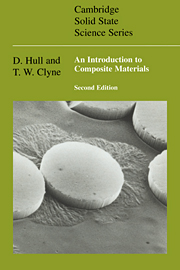Book contents
- Frontmatter
- Contents
- From the preface to First Edition
- Preface to Second Edition
- 1 General introduction
- 2 Fibres and matrices
- 3 Fibre architecture
- 4 Elastic deformation of long-fibre composites
- 5 Elastic deformation of laminates
- 6 Stresses and strains in short-fibre composites
- 7 The interface region
- 8 Strength of composites
- 9 Toughness of composites
- 10 Thermal behaviour of composites
- 11 Fabrication
- 12 Applications
- Appendix: Nomenclature
- Author index
- Subject index
9 - Toughness of composites
Published online by Cambridge University Press: 05 June 2012
- Frontmatter
- Contents
- From the preface to First Edition
- Preface to Second Edition
- 1 General introduction
- 2 Fibres and matrices
- 3 Fibre architecture
- 4 Elastic deformation of long-fibre composites
- 5 Elastic deformation of laminates
- 6 Stresses and strains in short-fibre composites
- 7 The interface region
- 8 Strength of composites
- 9 Toughness of composites
- 10 Thermal behaviour of composites
- 11 Fabrication
- 12 Applications
- Appendix: Nomenclature
- Author index
- Subject index
Summary
The previous chapter covered factors affecting strength, which is related to the stresses at which damage and failure occur in composites. In many situations, the energy absorbed by the material under load is equally important. A tough material is one for which large amounts of energy are required to cause failure. In many loading configurations, such as when a component is struck by a projectile, only a finite amount of energy is available to cause failure. In other cases, such as with loads arising from temperature changes, only a finite degree of strain needs to be accommodated in order for the stresses to become small. In such situations, toughness, rather than strength, is the hey property determining whether the material is suitable. In this chapter, a brief outline is given of the basics of fracture mechanics, with particular reference to the energetics of interfacial damage. This is followed by an appraisal of the sources of energy absorption in composites. Finally, slow crack growth in composites is examined for conditions where fast fracture is not energetically favoured.
Fracture mechanics
The reader is referred to sources such as Gordon (1978), Ashby and Jones (1980) and Ewalds and Wanhill (1984) for introductions to fracture mechanics. In this section, the treatment is abbreviated and oriented towards effects in composites.
- Type
- Chapter
- Information
- An Introduction to Composite Materials , pp. 208 - 236Publisher: Cambridge University PressPrint publication year: 1996
- 3
- Cited by

